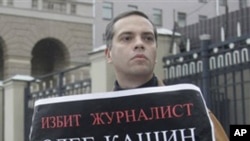A lead pipe attack on a reporter has led to something new in Russia: public condemnation by the nation's president.
Russia's President Dmitry Medvedev is taking an attack on a leading Moscow journalist as a direct challenge to his liberalization project for Russia.
In the attack, two men brutally beat Oleg Kashin, breaking his fingers, legs, jaw and fracturing his skull. They did not steal his wallet or his I-phone. His editor at Kommersant newspaper charged that Kashin was attacked for his critical coverage of pro-government youth groups and an environmental dispute.
In the past in Russia, official silence greeted murders of critical journalists - 19 in the past decade by one count.
But this near-fatal beating prompted President Medvedev to immediately order the nation's top prosecutor and the interior minister to oversee the investigation. State television channels, usually mute about attacks on journalists, led their news programs with reports of the beating.
In an interview with Rossiiskaya Gazeta a state-owned newspaper, Russia's president vowed: "These forces must be identified. Whoever is behind this crime, he will be punished irrespective of his position, social status, or his past merits, if he has any."
The president's position was strengthened by outrage from a video of the beating contained in a 90-second surveillance tape that was posted on the Russian internet.
Further enraging Russia's largely liberal blogosphere, two more journalists were reportedly beaten by unknown attackers Sunday and Monday. Hundreds of journalists have signed an online protest petition.
The research director for the Center for Media Studies in Moscow, Alexander Morozov, says attacks on reporters are "a direct challenge to President Medvedev."
He said for President Medvedev's political liberalization project to succeed, the attackers must be found and punished.
On Saturday, Russia's president jolted the nation's ruling party by vetoing a bill approved by Russia's parliament that would have further restricted rights to public protest. Continuing this new liberal trend, a leader of Russia's upper house of parliament has proposed a bill that would increase penalties for attacks against journalists.
But the press officer for the Russia chapter of Amnesty International, Natalia Sergeeva, says real change will come only when people who attack journalists start going to jail.
"First time that the president was clear about the investigation of the beating of a journalist, but nevertheless it is not the first time that the president claims something, and then we wait for results for years and years," said Sergeeva.
In the Kashin case, the investigation could lead back to government circles.
Three months ago, Molodaya Gvardiya, a pro-Kremlin youth group, posted on its website a column headlined Journalist-Traitors: Who Should be Punished. The report was illustrated with a photo of Kashin, stamped with the warning: "Will be punished."
On Saturday, minutes after President Medvedev had condemned the attack, the photo was removed the Molodaya Gvardiya site and replaced with a statement calling the attack a 'barbaric crime."
Brutal Attack on Journalist Challenges Russian Liberalization
- By James Brooke




